Kazimierz Łyszczyński | |
|---|---|
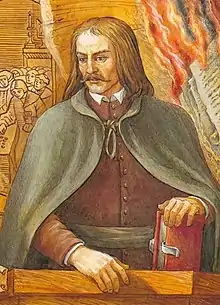 | |
| Born | 4 March 1634 Łyszczyce, Brest, Polish–Lithuanian Commonwealth |
| Died | 30 March 1689 (aged 55) Warsaw, Polish–Lithuanian Commonwealth |
| Cause of death | Execution |
| Nationality | Polish |
| Other names | Casimir Liszinski |
| Occupations | |
| Notable work | On the non-existence of God |
| Era | Age of Enlightenment |
| Region | |
Main interests | Religious skepticism |
Notable ideas | Atheism in Poland |
Kazimierz Łyszczyński (Polish pronunciation: [kaˈʑimjɛʂ wɨʂˈtʂɨɲskʲi]; 4 March 1634 – 30 March 1689),[1] also known in English as Casimir Liszinski, was a Polish nobleman, philosopher, and soldier in the ranks of the Sapieha family, who was accused, tried, and executed for atheism in 1689.[2][3]
For eight years he studied philosophy as a Jesuit and then became a podsędek (supply judge) in legal cases against the Jesuits concerning estates. He wrote a treatise entitled On the Non-Existence of God and was later executed on charges of atheism. His trial has been criticised[4] and is seen as a case of legalised religious murder in Poland.[5]
Life
Education and work
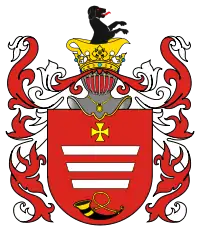
Kazimierz Łyszczyński was born in Łyszczyce, in what is now Brest District, Brest Region, Belarus. He became a nobleman, landowner,[4] philosopher, and soldier in the service of the Sapieha family. For eight years he studied philosophy as a Jesuit, but left the order[6] and then became a supply judge (podsędek) in legal cases against the Jesuits concerning estates. He was also member of the Sejm of the Polish–Lithuanian Commonwealth.[6]
Łyszczyński had read a book by Henry Aldsted entitled Theologia Naturalis, which attempted to prove the existence of divinity. But its arguments were so confused that Łyszczyński was able to infer many contradictions. Ridiculing Aldsted, Łyszczyński wrote in the book's margins the words "ergo non-est Deus" ("therefore God does not exist").[4]
This was discovered by one of Łyszczyński's debtors, Jan Kazimierz Brzoska, who was the nuncio of Brest in Poland or a Stolnik of Bracławice or Łowczy of Brześć. Brzoska, reluctant to return a great sum of money lent him by Łyszczyński, accused the latter of being an atheist and gave the aforementioned work as evidence to Witwicki, bishop of Poznań. Brzoska also stole and delivered to the court a handwritten copy of De non-existentia Dei, which was the first Polish philosophical treatise presenting reality from an atheistic perspective, and which Łyszczyński had been working on since 1674.[7]
Trial
Witwicki along with Załuski, bishop of Kiev, took up this case with zeal. King John III Sobieski attempted to help Łyszczyński by ordering that he should be judged at Vilnius, but this could not save Łyszczyński from the clergy. Łyszczyński's first privilege as a Polish noble, that he could not be imprisoned before his condemnation, was violated. The Łyszczyński case was brought before the diet of 1689 where he was accused of having denied the existence of God and having blasphemed against the Virgin Mary and the saints. He was condemned to death for atheism.[4]
Execution
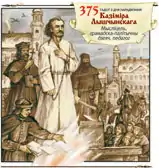
The sentence was carried out before noon in the Old Town Market Place in Warsaw, where his tongue was pulled out followed by a beheading.[4] After that, his corpse was transported beyond the city borders and cremated.
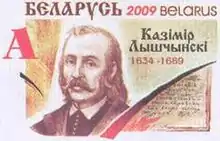
Bishop Załuski gave the following account of the execution:
After recantation the culprit was conducted to the scaffold, where the executioner tore with a burning iron the tongue and the mouth, with which he had been cruel against God; after which his hands, the instruments of the abominable production, were burnt at a slow fire, the sacrilegious paper was thrown into the flames; finally himself, that monster of his century, this deicide was thrown into the expiatory flames; expiatory if such a crime may be atoned for.[4]
De non-existentia Dei
Łyszczyński wrote a treatise, De non-existentia Dei (On the non-existence of God), stating that God does not exist and that religions are inventions of man.[8]
On the basis of a public denunciation, a trial was conducted before a Sejm commission. There is an actual transcript of the proceedings at the Kórnik library, including a speech by the Grand Duchy of Lithuania Instigator Regni Szymon Kurowicz Zabistowski, citing fragments of De non-existentia Dei. The treatise itself was destroyed by the Sejm, but the surviving cited fragments are as follows:
- I – we beseech you, o' theologians, by your God, if in this manner do you not extinguish the light of Reason, do you not oust the sun from this world, do you not pull down your God from the sky, when attributing to him the impossible, whereof the characteristics and attributes contradict themselves.
- II – Man is the creator of God, and God is a concept and creation of Man. Hence people are the architects and engineers of God, and God is not a true being but a being existing only within the mind; being chimeric by its nature, because a God and a chimera are the same thing.
- III – Religion was constituted by people without religion, so they could be worshipped although the God is not existent. Piety was introduced by the unpietic. The fear of God was spread by the unafraid so that the people were afraid of them in the end. Devotion named godly is a design of Man. Doctrine, be it logical or philosophical, bragging to be teaching the truth of God, is false, and on the contrary, the one condemned as false, is the very true one.
- IV – simple folk are cheated by the more cunning with the fabrication of God for their own oppression; whereas the same oppression is shielded by the folk in a way, that if the wise attempted to free them by the truth, they would be quelled by the very people.
- V – nevertheless we do not experience within us and within any other such an imperative of reason, which would ensure us of a truth of divine revelation. Alas if they were present in us, then everyone would have to acknowledge them and would have no doubts and would not contradict the Writings of Moses and the Gospels – which is not true – and there would be no different congregations and their followers as Mahomet etc. Such an imperative is not known and there are not only doubts, but there are some who deny a revelation, and they are not fools, but wise men, who with a proper reasoning prove what? the very contrary, what I also prove here. Concluding, that God does not exist".[9]
During his trial, Łyszczyński claimed that the work was to be about a Catholic and an atheist having a debate, in which the Catholic would eventually win (he told the diet that the work would have had a different title from De non-existentia Dei). The atheist was to speak first followed by the Catholic. He claimed that he only wrote the first half of the work (that is only the atheist's argument) and then stopped writing at the advice of a priest.
Status in modern Poland
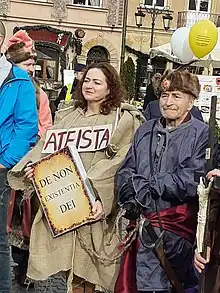
Regardless of whether Łyszczyński was genuinely an atheist, in communist Poland he came to be celebrated as a martyr to the atheist cause. In a series of papers, the philosopher Andrzej Nowicki presented a romanticized view of Łyszczyński, stating that "in terms of breadth of intellectual horizons, thoroughness of philosophical erudition, and boldness of thought, he was beyond doubt the most eminent Polish mind of the age."[10]
According to Pomian, "It appears that Łyszczyński was sentenced to death for writing a treatise entitled 'De non-existentia Dei' ... and all that remains are a few notes which were made during the trial. Apart from this and also the fact that his execution caused some controversy at the time on account of his being a member of the gentry, next to nothing is known about Łyszczyński. Łyszczyński's importance as a martyr of the atheist cause has led to his romanticization by Nowicki and to his rescue from a murky cell in the obscure by-ways of history. A copious amount of writing has appeared concerning both what is not known about him and what the content of his thought might have been. Nowicki writes boldly: 'Polish intellectual life cannot boast of any one figure who could compare with Łyszczyński in terms of breadth of intellectual horizons, the thoroughness of philosophical erudition and the boldness of thought. He was beyond doubt the most eminent Polish mind of the epoch.' What a pity that no one knows what the content of his thought was. According to the notes made at the trial, Łyszczyński, was curiously 'modern', even to the point of incongruity, in his critique of religion: all of his remarks might have been made by Marx or Lenin ... Łyszczyński clearly states his disbelief in God. The incongruity of this idea, however, lies in an inability to understand its genesis in the context of Polish society at that time ... there is no independent or clear evidence of other individuals with similar inclinations during Łyszczyński's time. To say that Łyszczyński was simply ahead of his time means nothing: it is an admission of the unavailability of an explanation."(Pomian-Srzednicki 1982, pp. 103–104)
In March 2014, his persona and ideas were the key theme in a public performance during the 2014 Procession of Atheists in Poland,[11][12] during which his execution was reenacted.[6]
See also
Citations and footnotes
- ↑ Nowicki, Andrzej. "Kazimierz Łyszczyński 1634–1689". Racjonalista.pl (in Polish). Retrieved 19 March 2019.
- ↑ Aleksander Gieysztor, et al. 1979, History of Poland, page 261: A Lithuanian nobleman, Kazimierz Lyszczynski, was even beheaded for his alleged, or real, atheism (1689)
- ↑ Jerzy Kłoczowski, 2000, A History of Polish Christianity, page 155: The most famous episode was the sentencing to death of Kazimierz Lyszczynski, a nobleman accused of atheism, by the Sejm court in 1689.
- 1 2 3 4 5 6 (Skorobohaty 1840, pp. 412–415, "Chapter XV") Cazimir Lyszczynski, a noble and landowner of Lithuania, a man of a very respectable character, was perusing a book entitled Theologia Naturalis, by Henry Aldsted, a Protestant divine, and finding that the arguments which the author employed in order to prove the existence of divinity, were so confused that it was possible to deduce from them quite contrary consequences, he added on the margin the following words – "ergo non-est Deus," evidently ridiculing the arguments of the author. This circumstance was found out by Brzoska, nuncio of Brest in Lithuania, a debtor of Lyszczynski, who denouned him as an atheist, delivering, as evidence of his accusation, a copy of the work with the above-mentioned annotation to Witwicki, bishop of Posnania, who took up this affair with the greatest violence. He was zealously seconded by Zaluski, bishop of Kiod, a prelate known for his great learning and not devoid of merit in other respects, which however proved no check to religious fanaticism. The king, who was very far from countenancing such enormities, attempted to save the unfortunate Lyszczynski, by ordering that he should be judged at Wilno; but nothing could shelter the unfortunate man against the fanatical rage of the clergy represented by the two bishops; and the first privilege of a Polish noble, that he could not be imprisoned before his condemnation, and which had theretofore been sacredly observed even with the greatest criminals, was violated. On the simple accusation of his debtor, supported by the bishops, the affair was brought before the diet of 1689, before which the clergy, and particularly the bishop Zaluski, accused Lyszczynski of having denied the existence of God, and uttered blasphemies against the blessed Virgin and the saints. The unfortunate victim, terrified by his perilous situation, acknowledged all that was imputed to him, made a full recantation of all he might have said and written against the doctrine of the Roman Catholic church, and declared his entire submission to its authority. This was, however, of no avail to him, and his accusers were even scandalized that the diet permitted him to make a defence, and granted the term of three days for collecting evidence of his innocence, as the accusation of the clergy ought, in their judgment, to be sufficient evidence on which to condemn the culprit. The fanaticism of the diet was excited in a most scandalous manner by the blasphemous representation that divinity should be propitiated by the blood of its offenders. The diet decreed that Lyszczynski should have his tongue pulled out, and then be beheaded and burnt. This atrocious sentence was executed, and the bishop Zaluski himself gives a relation of what he considered an act of piety and justice! The king was horror-struck at this news and exclaimed that the Inquisition could not do any thing worse. It is necessary, on this occasion, to render justice to Pope Innocent XI., who, instead of conferring a cardinal's hat on the bishop of Posnania, bitterly censured this disgraceful affair.
- ↑ The Spirit of Polish History by Antoni Chołoniewski. Translated by Jane (Addy) Arctowska. Published by The Polish Book Importing Co., inc., 1918. p. 38 "The execution of the nobleman Lyszczynski, accused of atheism, religious murder ordered by the Diet of 1689, remained an isolated case."
- 1 2 3 Theo Mechtenberg (3 February 2015). "Atheistische Bewegung im katholischen Polen" (PDF). Polen-Analysen (in German). Deutsches Polen-Institut. Retrieved 4 February 2019.
- ↑ Janusz Tazbir, 1966, Historia Kościoła Katolickiego w Polsce. 1460–1795: Catholics who were suspected of being atheists were treated much more severely than Protestants who openly proclaimed their beliefs. An example is given by a trial of nobleman Kazmierz Łyszczyński, who was sentenced to death for atheism in 1689. Łyszczyński is thought to have written a longer treatise on the existence of God, where he expressed his affection for atheism. The manuscript of this treatise was stolen by his personal foe, Jan Kazimierz Brzóska, who sent it to Poznań bishop Stanisław Witwicki, who accused the blasphemer in court. Other bishops supported this accusation. In effect the diet sentenced Łyszczyński to death by beheading and cutting of his tongue. King Jan Sobieski is said to have expressed his discontent by saying that the inquisition would not have undertaken a more severe decision. After the king's appeal the execution was limited to beheading only. The body of the blasphemer was burned. The trial was not well regarded in Rome. The pope thought that the bishops had abused their entitlements and that the sentence had been too severe. It is however worth noting that Łyszczyński's trial is the only known example in the 17th century of a noblemen being executed because of his beliefs.
- ↑ ATHEISM Archived 2 October 2008 at the Wayback Machine Polskie Towarzystwo Tomasza z Akwinu, p. 17
- ↑ Andrzej Nowicki, 1957
- ↑ (Pomian-Srzednicki 1982, pp. 103–104)
- ↑ "Marsz Ateistów w Warszawie. Inscenizacja egzekucji na rynku". Archived from the original on 26 August 2014. Retrieved 25 August 2014.
- ↑ "Koalicja Ateistyczna: An Encounter with Polish Atheists". Archived from the original on 26 August 2014. Retrieved 25 August 2014.
References
- Skorobohaty, Walerjan (1840), Historical Sketch of the Rise, Progress And Decline of the Reformation in Poland V1, University of Michigan
- L. Łyszczinskij, Rod dworian Łyszczinskich, S. Pietierburg 1907.
- A. Nowicki, Pięć fragmentów z dzieła "De non-existentia dei" Kazimierza Łyszczyńskiego (by a script fromLibrary of Kórnik nr 443), "Euhemer", nr 1, 1957, pp. 72–81.
- A. Nowicki, Aparatura pojęciowa rozważań Kazimierza Łyszczyńskiego (1634–1689) o religii i stosunkach między ludźmi, "Euhemer, Zeszyty Filozoficzne", nr 3, 1962, pp. 53–81.
- A. Nowicki, Studia nad Łyszczyńskim, "Euhemer, Zeszyty Filozoficzne", nr 4, 1963, pp. 22–83.
- A. Nowicki, Pięć wiadomości o Łyszczyńskim w gazecie paryskiej z roku 1689, "Euhemer, Zeszyty Filozoficzne", nr 4, 1963, pp. 40–44.
- A. Nowicki, Sprawa Kazimierza Łyszczyńskiego na Sejmie w Warszawie w świetle rękopisu Diariusza Sejmowego, znajdującego się w Wojewódzkim Archiwum Państwowym w Gdańsku, "Euhemer, Zeszyty Filozoficzne", nr 4, 1963, pp. 23–39.
- Ateizm Kazimierza Łyszczyńskiego, (w:) A. Nowicki, Wykłady o krytyce religii w Polsce, Warszawa 1965, pp. 51–68.
- Janusz Tazbir, Historia Kościoła katolickiego w Polsce (1460 -1795), Warsaw 1966.
- Pomian-Srzednicki, Maciej (1982), Religious Change in Contemporary Poland: Secularization and Politics, Routledge, pp. 103–4, ISBN 0-7100-9245-8
- Pomian-Kłoczowski, Jerzy (2000), A History of Polish Christianity, Cambridge University Press, p. 155, ISBN 0-521-36429-9
External links
- A. Nowicki: Kazimierz Łyszczyński, Towarzystwo Krzewienia Kultury Świeckiej, Łódź 1989, p. 80.
- Kazimierz Łyszczyński's Web List of Atheists and Agnostics